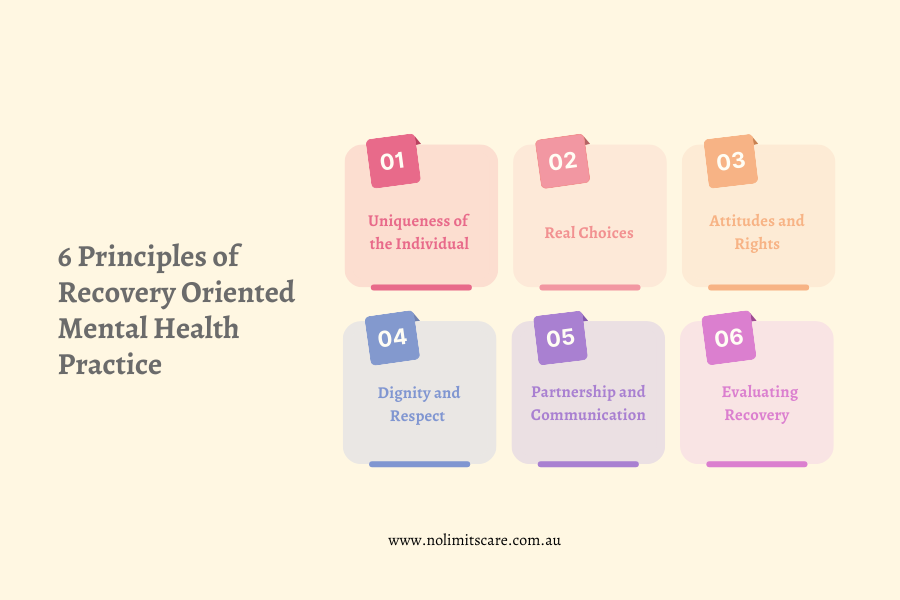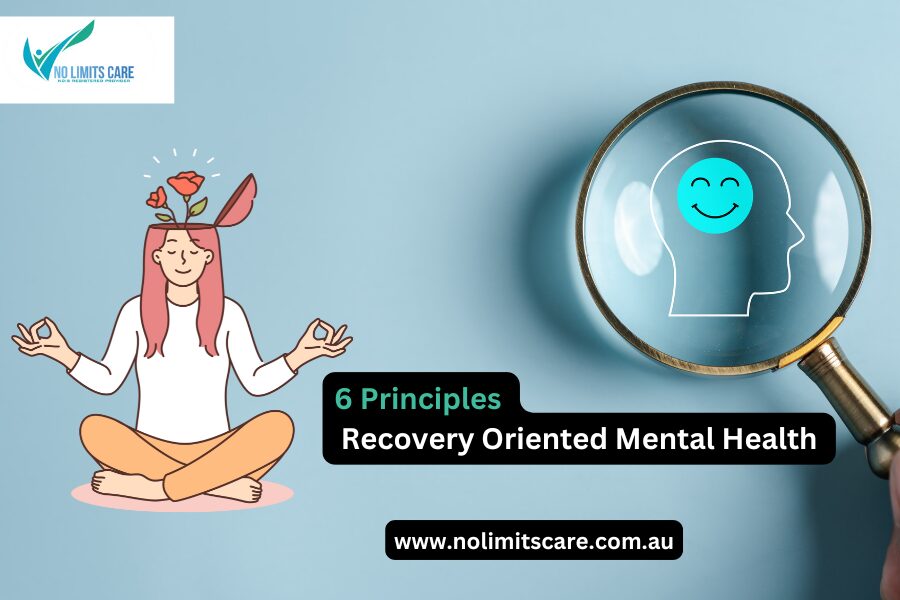Table of Contents
Disabilities related to mental health are often more deep-rooted than physical disabilities and shake the interior of an individual who goes through them, and NDIS takes it seriously. Over the years, NDIS has taken inspiration from the 6 principles of recovery-oriented mental health practices to upgrade their service category ‘psychosocial disability’.
This was to ensure the development of a holistic recovery procedure for the disabled participants. In this regard, this blog will outline these 6 principles and analyse their application and impact on NDIS. Let us guide you through it!
6 Principles of Recovery Oriented Mental Health Practice: An NDIS Analysis

6 Principles of Recovery Oriented Mental Health Practice: Purpose
According to individuals who have a psychosocial disability, recovery means “hope”. This hope extends to many things, including social inclusivity, a newfound sense of self-worth, a meaningful and purposeful life, autonomy and independence and so on.
“It is important to remember that recovery is not synonymous with cure. Recovery refers to both internal conditions experienced by persons who describe themselves as being in recovery— hope, healing, empowerment and connection—and external conditions that facilitate recovery—implementation of human rights, a positive culture of healing, and recovery-oriented services.” (Jacobson and Greenley, 2001 p. 482)
So, the purpose of the “6 principles of recovery oriented mental health practice” is to execute mental health service facilities in such a way that an individual receiving them not only heals and recovers from that issue but also experiences a life full of enlightenment, self-growth, and positivity, coupled with holistic development, so that the person enjoys their fundamental human rights, social life and professional endeavours, further promoting autonomy.
Principle 1: Uniqueness of the Individual
The first principle of recovery-oriented mental health practice focuses on quality of life. This means recovery should go beyond the mere scope of “cure,” extending itself to other areas of life. Ideally, a person should live a purposeful and satisfying life within a community, along with their unique personalities, without being judged in a societal structure. This is backed by model services that empower these individuals by making them the centre of attention.
Illustration
Elara, a young artist living in Fitzroy, had struggled with social anxiety for years. Traditional group therapy hadn’t helped. Her support worker, recognising the definition of mental health recovery as a personal journey, suggested exploring art therapy at a local community centre. Elara blossomed, finding expression and connection through her paintings. She began showcasing her work at local galleries, her confidence growing with each exhibition. Her recovery wasn’t about overcoming social situations entirely, but finding a unique path to a fulfilling life.
Principle 2: Real Choices
As the name suggests, this principle encourages individuals to make their own life choices and decisions. It facilitates informed decision-making and provides them with all the tools and means to do so. The individuals are further provided with basic training to become independent and take on their own responsibilities. With a certain duty of care, the principle also encourages positive risks to improve their quality of life.
Illustration
Michael, a former accountant living in Docklands, experienced a severe depressive episode after losing his job. Feeling lost, he was introduced to the mental health recovery framework. This framework emphasised choice, and he was offered various options: medication, CBT, peer support groups, and vocational training. After careful consideration, Michael chose a combination of CBT and vocational training in web design, a long-held interest. He regained a sense of purpose by learning new skills and eventually secured a freelance web development role, taking control of his recovery.
Principle 3: Attitudes and Rights
The third principle upholds fundamental rights and open communication. A service provider must actively listen to the concerned individual and their carers regarding what is essential (e.g., social, occupational, recreational, and other areas) to them. Beyond fundamental rights, the principle also promotes and protects citizenship and legal rights. Most importantly, it helps individuals gain hope in the good things about life.
Illustration
Aisha, a Sudanese refugee living in Flemington, experienced trauma and subsequent PTSD. Initially, she felt dismissed by services that didn’t understand her cultural background. However, a local multicultural mental health service, understanding what are the principles of recovery oriented practice, prioritised culturally sensitive care. They connected her with a bilingual therapist and a community support group that respected her cultural values and beliefs. This empowered Aisha to advocate for her rights and access appropriate support.
Principle 4: Dignity and Respect
The principle of dignity and respect is about being honest and courteous in all interactions. It is the pillar of all the 6 principles of recovery oriented mental health practice pdf It promotes and prioritises compassion and sensitivity, especially in matters regarding culture, beliefs, and personal values. The principle fights against social stigmas and overall discrimination.
Illustration
David, experiencing homelessness and struggling with substance use in the CBD, often felt judged and stigmatised. Outreach workers trained in the principles of recovery model mental health approached him with empathy and respect. They offered him practical support, like access to showers, meals, and temporary accommodation, without judgment. This respectful approach built trust, enabling David to engage with support services and begin his journey towards recovery.
Principle 5: Partnership and Communication
Promoting healthy collaboration, open communication, and a spirit of teamwork, this principle acknowledges that each person is an ‘expert on their own life’ and that expertise can only shine through if it gets polished with the help of others (i.e., caregivers, support workers, etc.). It further encourages both the individuals and their support workers to work in realistic yet positive ways so that, as a result, everyone is happy and satisfied.
Illustration
Sarah, living in Richmond, was diagnosed with bipolar disorder. Her initial experience with mental health services felt impersonal and disempowering. However, when she transitioned to a service that embraced a mental health recovery approach, everything changed. She was actively involved in developing her care plan, working in partnership with her psychiatrist, psychologist, and support worker. This collaborative approach empowered Sarah to take ownership of her recovery.
Principle 6: Evaluating Recovery
The last principle concerns multi-level recovery facilities and continuous evaluation, wherein caregivers and individuals can track their respective signs of progress. The experiences of disabled individuals are further considered to improve service processes. Special emphasis is laid on the development of employment, education, housing, society, and family-related endeavours.
Illustration
John, living in Brunswick, had been struggling with severe anxiety for many years. He started attending a local community mental health program that emphasised recovery oriented practices, including regular self-assessment and feedback. John used a simple mood tracker app on his phone and discussed his progress with his support worker. This ongoing evaluation helped him to identify what strategies were working and adjust his approach accordingly, leading to significant improvements in his well being.
How NDIS Applies These 6 Principles of Recovery Oriented Mental Health Practices?
The NDIS applies the 6 principles of recovery oriented mental health practices in the following ways:
Early Intervention
Early intervention, as the name suggests, stops the further deterioration of a disease that causes impairment. It is a preventive measure that indirectly promotes the sixth principle of recovery-oriented mental health practices, wherein interventions are executed based on the history of another person with the same kind of impairment.
Community Participation
The NDIS has a separate category for community participation, which advances services like group therapy, group activities, social inclusion programs, and so on. This reflects the first principle, “uniqueness of the individual,” which also advocates the same (i.e., the fulfilment of an individual lies in community inclusion and belongingness).
Individualised Planning Options
Running parallel to the core values of principle 3, “attitudes and rights,” the individualised planning options offered by the NDIS through its various modules (e.g., ILO, plan management, etc.) ensure that all NDIS participants enjoy all the rights any ordinary individual would want (like living alone or living with someone else and much more). Check out Lifecare Independent Living’s ‘Short Term Accommodation’ options for personalised NDIS respite.
Choice & Control
The NDIS grants all participants choice and control, where they get to choose the providers they want, the support coordinator, or, in this case, the psychosocial recovery coach they would like to work with, and so on. The second principle comes to work here, which highlights the relevance of choice and control in mental health recovery.
Therapeutic Support
Therapeutic support functions beyond just providing mental health support to NDIS participants; rather, it extends to the holistic growth and development of the NDIS individuals. This particular NDIS support covers all 6 principles of recovery-oriented mental health practice at once.
You might be interested in this blog post – Therapeutic Support NDIS: Everything You Need To Know
Conclusion: How No Limits Have Been Pushing To Achieve It?
At No Limits Care, we are committed to recovery-oriented mental health practices in our NDIS therapeutic support in Melbourne. Our personalised care plans reflect the principle of the individual’s uniqueness, allowing participants to choose from various therapeutic options—occupational therapy, speech pathology, physiotherapy, psychology, positive behaviour support, and exercise physiology—to best meet their goals.
We embrace a collaborative approach with families and caregivers, embodying partnership and collaboration to ensure everyone’s voice is valued. We focus on enhancing independence and emotional well-being, which are aligned with dignity and respect principles. By prioritising individualised assessments and ongoing evaluations, we uphold the principle of evaluating recovery for continuous improvement. Our holistic approach truly embodies the core tenets of the 6 principles of recovery-oriented mental health practices.


